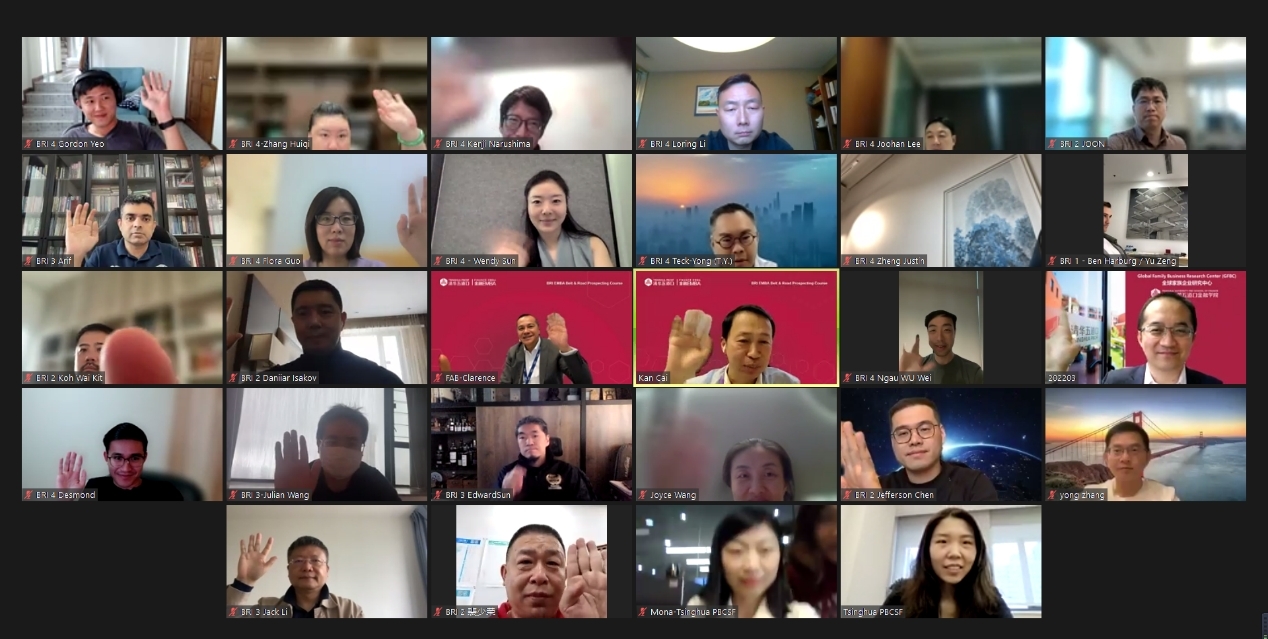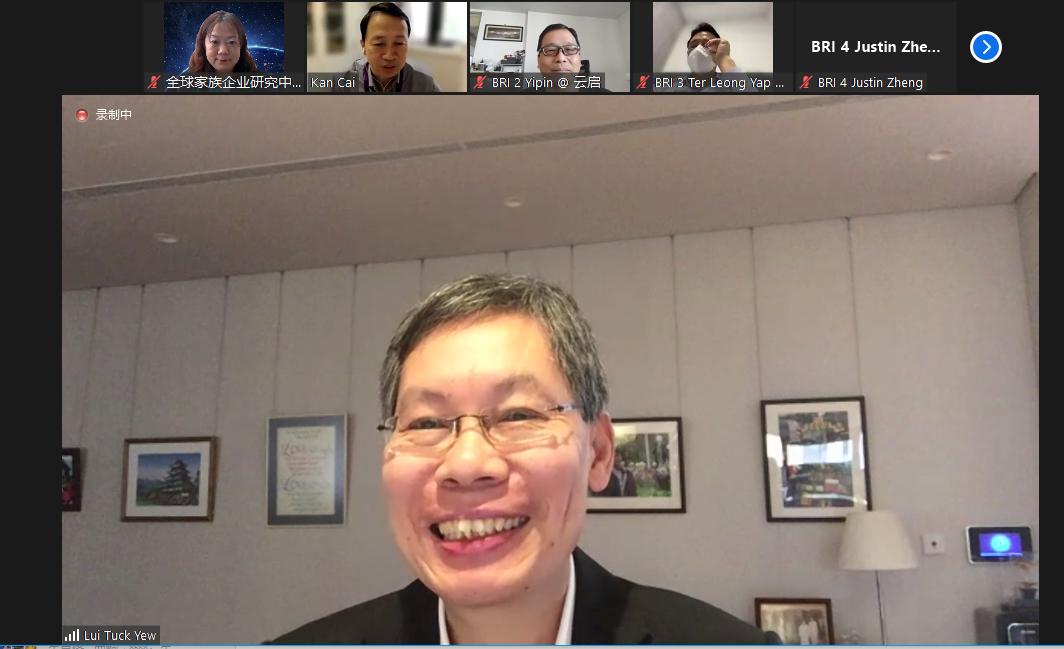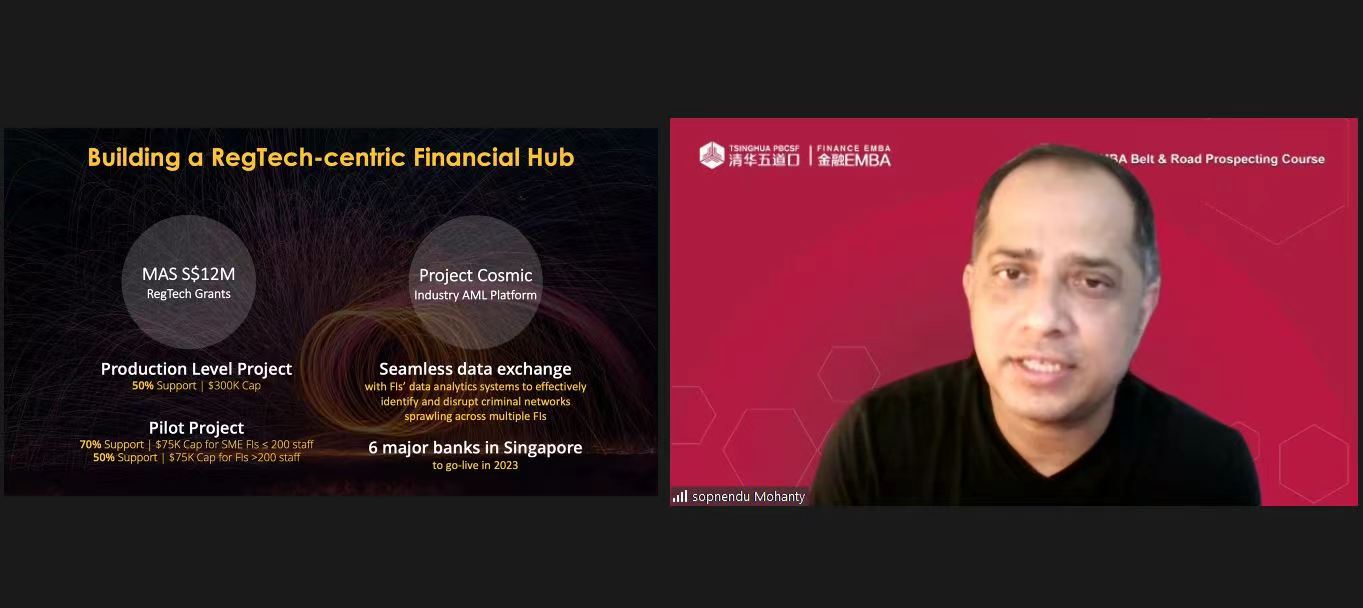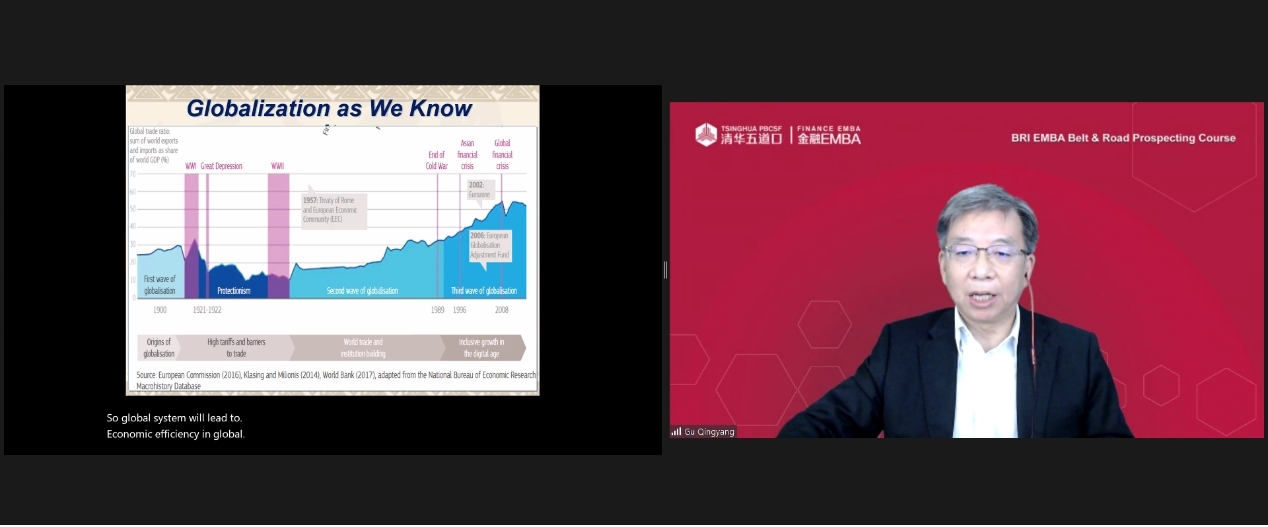On March 24, 2022, the Belt and Road Prospecting course, Tsinghua PBCSF’s newest innovative attempt to continue our EMBA program delivery in the post-pandemic era, commenced its third session – Singapore - online. More than 50 students from the Tsinghua PBCSF BRI EMBA Program joined the session.

Students from the Tsinghua PBCSF BRI EMBA Program greeting one another during the Belt and Road Prospecting online course of Tsinghua PBCSF.
Since 2013, China has been Singapore’s largest trading partner. Singapore, over this period, has also been the largest investor in China. Opening the session with an overview of the Singapore-China and ASEAN-China economic relations, H.E. Lui Tuck Yew, Ambassador to the Singapore Embassy in Beijing, shared about Singapore’s prospects and challenges, and conversed with the students about their work experiences in Singapore.

H.E. Lui Tuck Yew addressing the students on the Singapore-China relations over the years
For this session, two distinguished guest speakers were invited to share their experiences and insights with the students. Mr. Sopnendu Mohanty, Chief Fintech Officer of the Monetary Authority of Singapore, talked about the future of Fintech and the Singapore model. Prof. Qingyang Gu, Associate Professor at the Lee Kuan Yew School of Public Policy (LKYSPP) of the National University of Singapore, added an academic edge by looking at the opportunities and challenges of the Belt and Road Initiative.
Mr. Sopnendu Mohanty is responsible for creating development strategies, public infrastructure, and policies around technology-driven innovation. He has over two decades of public and private sector experience in technology, operations, digital finance, and investment strategies. Within five years of his leadership, Singapore has become a leading global Fintech hub producing unicorns and home to many vibrant Fintech companies.

Mr. Sopnendu Mohanty addressing the students on the development of Fintech in Singapore
Mr. Sopnendu Mohanty discussed live experimentation via regulatory sandbox, accelerating collaboration between incumbents and Fintech players, reshaping payment services with technology, generating deep insights with industry-wide AI platforms, digital currencies, as well as green finance. With respect to the Singapore-China collaboration on their respective Fintech ecosystems, he talked about the historic cooperation agreements, provincial initiatives, outreach programs and platforms, and industry-level partnerships.

Prof. Qingyang Gu, Associate Professor at the Lee Kuan Yew School of Public Policy (LKYSPP) of the National University of Singapore, presenting on the Belt and Road Initiative
Professor Qingyang Gu has worked in higher education for 40 years and his research interests include Chinese economy, China and the global economy, urban policy, BRI, as well as globalization. He is very active in providing professional trainings and consulting services for various government agencies and companies in Greater China, Singapore, Malaysia, Japan, India, Russia and Latin America.
Going over the current landscape of globalization and the distribution of international trade flows, Prof. Gu pointed out on the big challenges of global infrastructure development and global geopolitics. He then discussed the war in Ukraine, China’s dual circulation model, and how RCEP and BRI fit into China’s new economic development scheme. In addition, Prof. Gu elaborated on the complexity of BRI projects and Singapore’s participation in the Initiative.
The Belt and Road Prospecting course, co-developed with the Global Family Business Research Center of Tsinghua National Institute of Financial Research, aims to invite relevant experts to participate in all aspects of the course by a BRI country's economic policy makers, embassy/government officials, business leaders and senior scholars, to illustrate to the students the country's social and economic environment, its unique economic and financial as well as sustainable development, and its latest progress, helping the students deepen the understanding of the country's investment environment and business opportunities, so as to construct a better understanding of the Belt and Road Initiative and countries along the route.
The course will continue with the last session on UAE on March 25.
Since its inception in May 2017, the Belt and Road Initiative (BRI) EMBA Program has attracted more than 200 high-level enterprise decision-makers from 23 countries and regions, including Singapore, Indonesia, Malaysia, Thailand, the United States, Canada, Kyrgyzstan, Kazakhstan. A number of students from Southeast Asian Countries hold Tan Sri, Dato' Sri, Dato’, Tengku and other honorary titles. Nearly 40% of the students graduated from world-renowned universities such as MIT, Stanford, Harvard, Yale, Cornell, Oxford, Cambridge and Imperial College London.